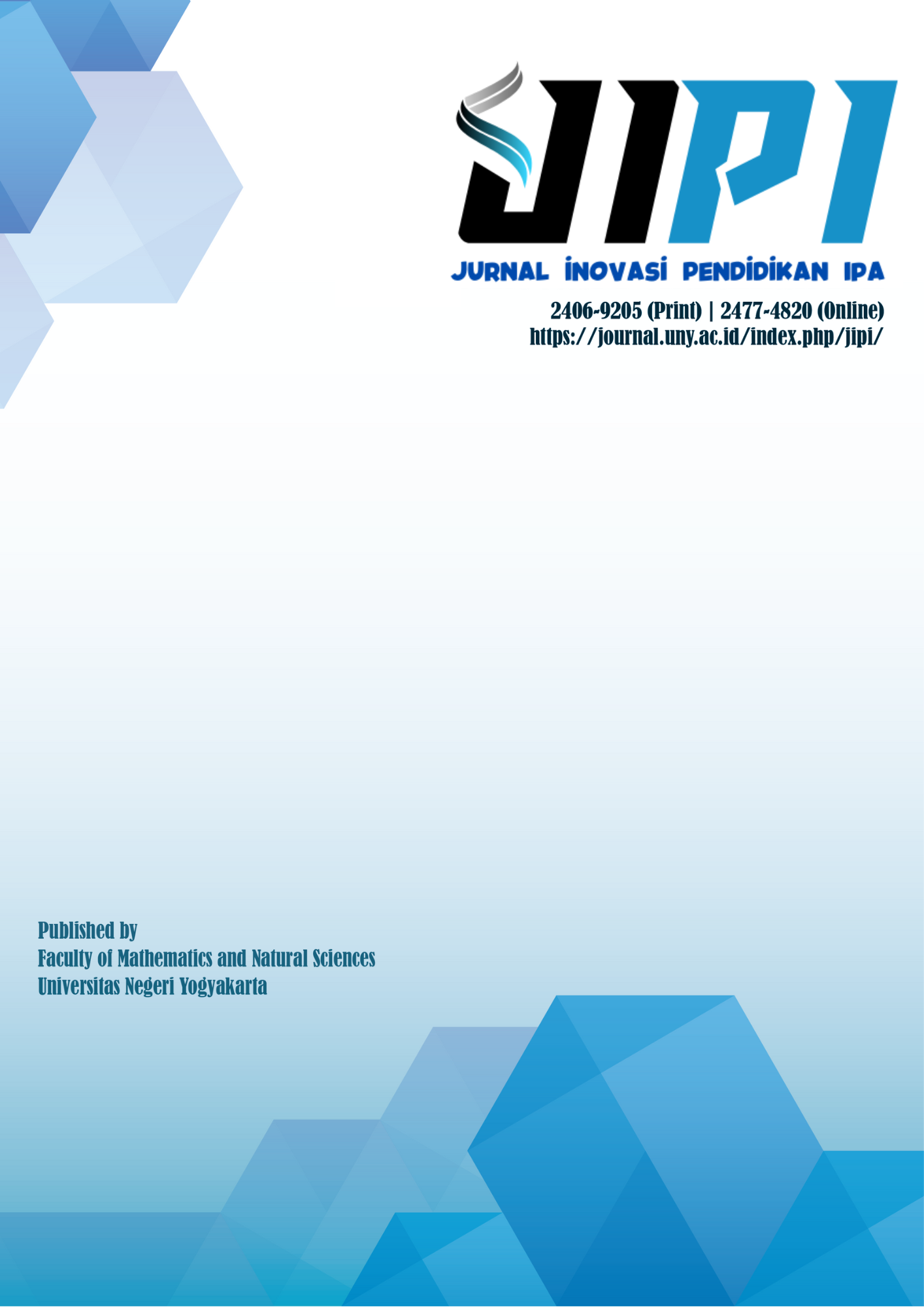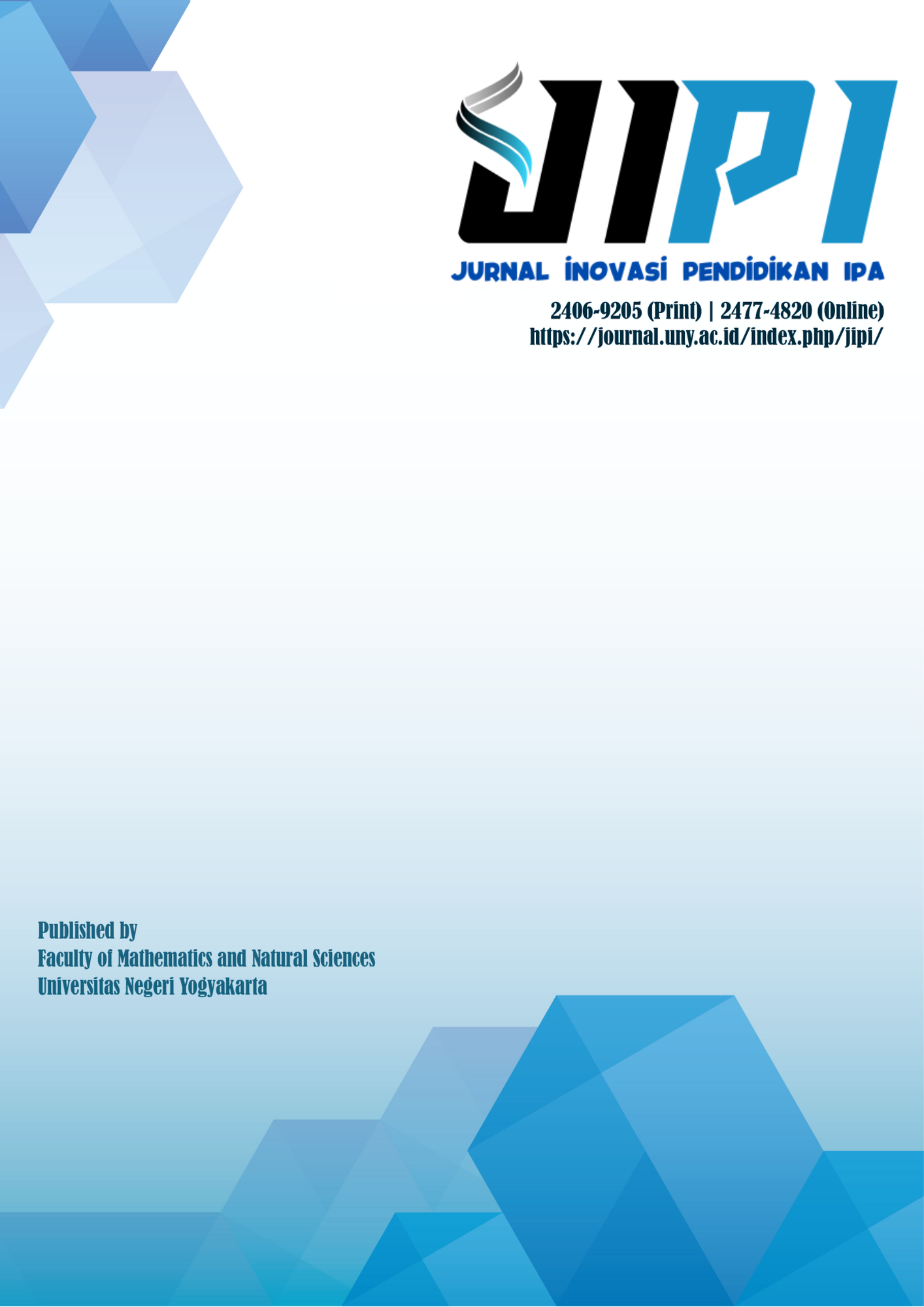Enhancing Critical Thinking Through Coastal Culture-Based Differentiated Science Learning
DOI:
https://doi.org/10.21831/jipi.v11i2.88295Keywords:
coastal culture, critical thinking skills, differentiated science learningAbstract
The purpose of this study was to enhance critical thinking skills through the implementation of coastal culture-based differentiated science learning. The research was conducted from August to November 2024 using a quasi-experimental nonequivalent control group design at State Junior High School 2 Bengkulu, Indonesia. The sample consisted of three eighth-grade classes: experimental group 1 (8A), experimental group 2 (8B), and the control group (8C), selected through purposive sampling. Students’ critical thinking skills were assessed using a validated and reliable test instrument (r = .89). Data were analyzed with one-way ANOVA, which revealed significant differences among groups (p < .001). The average N-gain score of critical thinking skills in experimental group 1 (.40, medium category) was higher than that of experimental group 2 (.20, low category) and the control group (.009, low category). Based on the hypothesis testing, it can be concluded that coastal culture-based differentiated science learning has a significant effect on students’ critical thinking skills (p < .001). These findings confirm that culturally contextualized differentiated learning significantly enhances critical thinking. Theoretically, this model contributes to science pedagogy by integrating cultural relevance to support effective, innovative instruction
References
Abdullah, S. M. (2019). Social Cognitive Theory : A Bandura Thought Review published in 1982-2012. Psikodimensia, 18(1), 85. https://doi.org/10.24167/psidim.v18i1.1708
Albashtawi, A. H., Jaganathan, P., & Singh, M. K. M. (2020). Facilitating the acquisition of receptive vocabulary knowledge among efl undergraduates using a cognitive approach. International Journal of Instruction, 13(2), 269–284. https://doi.org/10.29333/iji.2020.13219a
Anggraini, N. P., Budiyono, & Pratiwi, H. (2019). Analysis of higher order thinking skills students at junior high school in Surakarta. Journal of Physics: Conference Series, 1211(1). https://doi.org/10.1088/1742-6596/1211/1/012077
Antink-Meyer, A., Brown, M., & Wolfe, A. (2023). The Scientific Curiosity of Preservice Elementary Teachers and Confidence for Teaching Specific Science Topics. Journal of Science Teacher Education, 34(8), 883–902. https://doi.org/10.1080/1046560X.2023.2168858
Astawan, I. G., Suarjana, I. M., Werang, B. R., Asaloei, S. I., Sianturi, M., & Elele, E. C. (2023). Stem-Based Scientific Learning and Its Impact on Students’ Critical and Creative Thinking Skills: an Empirical Study. Jurnal Pendidikan IPA Indonesia, 12(3), 482–492. https://doi.org/10.15294/jpii.v12i3.46882
Astutik, J., Lutfi, A., & Sutoyo, S. (2025). Enhancing Critical Thinking Skills for Sustainable Education: a Case Study of Indonesian Junior High School Students in Kuala Lumpur, Malaysia to Support SDG-4 Quality Education. Journal of Lifestyle and SDGs Review, 5(3), e04842. https://doi.org/10.47172/2965-730x.sdgsreview.v5.n03.pe04842
Ayano, E. I., Bateman, J. M., Kohlmann, L., & Adah Miller, E. C. (2025). Exploring Science Teachers’ Reflections on Using Identity and Criticality to Design Social Justice-Oriented Environments. Education Sciences, 15(5), 1–17. https://doi.org/10.3390/educsci15050625
Azari, A. M., Rochintaniawati, D., & Agustin, R. R. (2024). Can Web-Based AI Be Implemented in the Middle School Science Classroom? A Critical Review. Jurnal Inovasi Pendidikan IPA, 10(2), 175–184. https://doi.org/10.21831/jipi.v10i2.75364
Banks, J. A. B. & C. A. M. (2019). Multicultural Education: Issues and Perspectives. Wiley.
Borg, G. C., & Kumblathan, T. (2025). Bridging Indigenous Ways of Knowing with Western Science Pedagogy in STEM Education. Analytical Chemistry, 97(19), 10097–10098. https://doi.org/10.1021/acs.analchem.5c02421
Caingcoy, M. E. (2023). Culturally responsive pedagogy: A Systematic Overview Pedagogia Culturalmente Responsiva: Uma Visão Sistemática. Diversitas Journal, 8(4), 3203–3212. https://doi.org/10.31219/osf.io/8ctav
Cairns, D., & Areepattamannil, S. (2019). Exploring the Relations of Inquiry-Based Teaching to Science Achievement and Dispositions in 54 Countries. Research in Science Education, 49(1), 1–23. https://doi.org/10.1007/s11165-017-9639-x
Cheng, M. M. H., Jones, A., & Buntting, C. (2017). Learning, teaching, and assessing science in the Asia-Pacific context. Studies in Science Education in the Asia-Pacific Region, 1–12. https://doi.org/10.4324/9781315717678-1
Chusni, M. M. (2022). Effectiveness of discovery learning-based multiple representation module on enhancing the critical thinking skills of the students with high and low science process skills. Jurnal Inovasi Pendidikan IPA, 8(2), 199–209. https://doi.org/10.21831/jipi.v8i2.49340
Drake, A. K., Dunmall, K. M., Nguyen, V. M., Provencher, J. F., Henri, D. A., & Alexander, S. M. (2023). Bridging Indigenous and Western sciences: Decision points guiding aquatic research and monitoring in Inuit Nunangat. Conservation Science and Practice, 5(8), 1–22. https://doi.org/10.1111/csp2.12972
Ennis, R. H. (1991). Critical Thinking: A Streamlined Conception. Teaching Philosophy, 14(1), 5–24. https://doi.org/https//10.1057/9781137378057_2
Facione, P. A. (1990). Critical Thinking : A Statement of Expert Consensus for Purposes of Educational Assessment and Instruction Executive Summary “ The Delphi Report. The California Academic Press, 423(c), 1–19.
Fonger, N. L., Ellis, A. B., & Dogan, M. F. (2019). Epistemological and Methodological Foundations of Creating A Learning Trajectory of Children ’ s Mathematics. Eleventh Congress of the European Society for Research in Mathematics Education, February, 1–9.
Hake, R. R. (2002). Relationship of individual student normalized learning gains in mechanics with gender, high-school physics, and pretest scores on Mathematics and Spatial Visualization. Physics Education Research Conference, 8(August 2002), 1–14.
Handayani, W., Setiawan, W., Sinaga, P., & Suhandi, A. (2018). Students’ reading comprehension skills of science and physics texts. Jurnal Inovasi Pendidikan IPA, 4(2), 203–211. https://doi.org/10.21831/jipi.v4i2.21633
Hikmawati, H., Gunawan, G., Sahidu, H., & Kosim, K. (2021). Effect of Local Culture Based Learning in Science on Critical Thinking and Student Communication Skills. Journal of Science and Science Education, 2(1), 8–16. https://doi.org/10.29303/jossed.v2i1.713
Hunaepi, H., Suma, I. K., & Subagia, I. W. (2024). Curiosity in Science Learning: A Systematic Literature Review. International Journal of Essential Competencies in Education, 3(1), 77–105. https://doi.org/10.36312/ijece.v3i1.1918
Kuswandi, N. F., Meriza, N., Maulina, D., & Utami, G. N. (2025). Enhancing Students ’ Scientific Literacy on Environmental Pollution through Problem-Based Learning and Interactive Digital Modules. 10(1), 39–49. https://doi.org/10.24042/tadris.v10i1.21343
Ministry of Education, Culture, Research, and Technology of Indonesia. (2022). Guide to Implementing Kurikulum Merdeka. Jakarta: Kementerian Pendidikan, Kebudayaan, Riset, dan Teknologi.
Mustakim, S. S. B., Sulaiman, T., Lei, X., & Zou, Y. (2024). Promoting High-Order Thinking Skills through Problem-Based Learning: Design and Implementation. International Journal of Academic Research in Progressive Education and Development, 13(3). https://doi.org/10.6007/ijarped/v13-i3/21697
Phillipson, N., & Wegerif, R. (2019). The thinking together approach to dialogic teaching. Deeper Learning, Dialogic Learning, and Critical Thinking: Research-Based Strategies for the Classroom, September 2019, 32–47. https://doi.org/10.4324/9780429323058-3
Purwanto, A., Rahmawati, Y., Rahmayanti, N., Mardiah, & Amalia, R. (2022). Socio-critical and Problem Oriented Approach in Environmental Isues for Students’ Critical Thinking Skills Development in Chemistry Learning. Journal of Technology and Science Education, 12(1), 50–67.
Puspa, V. R., Djufri, Hasanuddin, & Hartini, S. (2020). The diversity of trees and open green spaces (OGS) at Universitas Syiah Kuala. Journal of Physics: Conference Series, 1460(1). https://doi.org/10.1088/1742-6596/1460/1/012078
Rahmawati, Y., & Ridwan, A. (2018). Integrating indigenous knowledge into chemistry learning to promote sustainability and social justice. International Journal of Science and Mathematics Education, 16(4), 669–681.
Rizal, A., Riyadi, A., Haryanti, Aliah, R. S., Prayogo, T., Prayitno, J., Purwanta, W., Susanto, J. P., Sofiah, N., Djayadihardja, Y. S., Ikhwanuddin, M., Wahyono, S., Yudo, S., & Sachoemar, S. I. (2022). Development of Sustainable Coastal Benchmarks for Local Wisdom in Pangandaran Village Communities. Sustainability (Switzerland), 14(21), 1–19. https://doi.org/10.3390/su142114648
Rizal, R., Herlina, H., Surahman, S., Yunus, S. R., & Yaakob, M. F. M. (2025). Integration of Kaili Local Culture in Learning the Theme of My Living Environment in Elementary Schools. Tekno - Pedagogi : Jurnal Teknologi Pendidikan, 15(1), 147–159. https://doi.org/10.22437/teknopedagogi.v15i1.42214
Sapan, M., & Mede, E. (2022). The Effects of Differentiated Instruction (DI) on Achievement, Motivation, and Autonomy among English Learners. Iranian Journal of Language Teaching Research, 10(1), 127–144. https://doi.org/10.30466/ijltr.2022.121125
Snively, G., & Williams, W. L. (2016). Knowing home: Braiding Indigenous science with Western science. University of Victoria.
Su, T., Liu, J., Meng, L., Luo, Y., Ke, Q., & Xie, L. (2025). The effectiveness of problem-based learning (PBL) in enhancing critical thinking skills in medical education: a systematic review and meta-analysis. Frontiers in Education, 10(June), 1–10. https://doi.org/10.3389/feduc.2025.1565556
Suyitno, H., Zaenuri, Florentinus, T. S., & Zakaria, E. (2018). Strategy for integration of coastal culture in learning process of mathematics in junior high school. Journal of Physics: Conference Series, 983(1). https://doi.org/10.1088/1742-6596/983/1/012080
Tanjung, Y. I., Arsih, F., Aizri, M., & Makrooni, G. (2025). Culturally Responsive Teaching in Science Education and its Relationship with Technopreneurship. APTISI Transactions on Technopreneurship (ATT).7(2).
Tomlinson, C. A. (2017). How to differentiate instruction in academically diverse classrooms (3rd ed.). ASCD.
Tytler, R. (2019). Re-imagining science education: Engaging students in science for Australia’s future. Australian Council for Educational Research.
Üstün, Ü. D., & Yapıcı, A. (2019). A Comparison of Perceived Social Anxiety among Individual and Team Sports Participant High School Students. World Journal of Education, 9(6), 1. https://doi.org/10.5430/wje.v9n6p1
Weaver, K. (2023). Bridging Indigenous and Western knowledge-systems in knowledge co-production with Amazonian Indigenous communities: a systematic realist review. Development Studies Research, 10(1). https://doi.org/10.1080/21665095.2023.2203842
Wekwete, P., & Higgs, L. (2024). Obstacles to critical thinking: A qualitative study on secondary school learners in Masvingo, Zimbabwe. South African Journal of Education, 44(1), 1–7. https://doi.org/10.15700/saje.v44n1a2261
Xu, E., Wang, W., & Wang, Q. (2023). The effectiveness of collaborative problem solving in promoting students’ critical thinking: A meta-analysis based on empirical literature. Humanities and Social Sciences Communications, 10(1), 1–11. https://doi.org/10.1057/s41599-023-01508-1
Yani, I., Budiana, S., Rostikawati, T., Sundari, F. S., & Umam, M. A. K. (2025). Enhancing Students’ Pollution Problem-Solving Skills Through Problem-Based Learning: The Moderating Role of Mathematical Literacy. Journal of Mathematics Instruction, Social Research and Opinion, 4(2), 347–356. https://doi.org/10.58421/misro.v4i2.431
Zhao, Y., Han, Z., Zhang, C., Wang, Y., Zhong, J., & Gao, M. (2024). Coastal Cultural Ecosystem Services: A Bridge between the Natural Ecosystem and Social Ecosystem for Sustainable Development. Land, 13(9). https://doi.org/10.3390/land13091352
Downloads
Published
Versions
- 2026-01-29 (2)
- 2025-10-20 (1)
How to Cite
Issue
Section
Citation Check
License

This work is licensed under a Creative Commons Attribution-ShareAlike 4.0 International License.
The authors submitting a manuscript to this journal agree that, if accepted for publication, copyright publishing of the submission shall be assigned to Jurnal Inovasi Pendidikan IPA (JIPI). However, even though the journal asks for a copyright transfer, the authors retain (or are granted back) significant scholarly rights.
Jurnal Inovasi Pendidikan IPA by http://journal.uny.ac.id/index.php/jipi/index is licensed under a Creative Commons Attribution-ShareAlike 4.0 International License.










